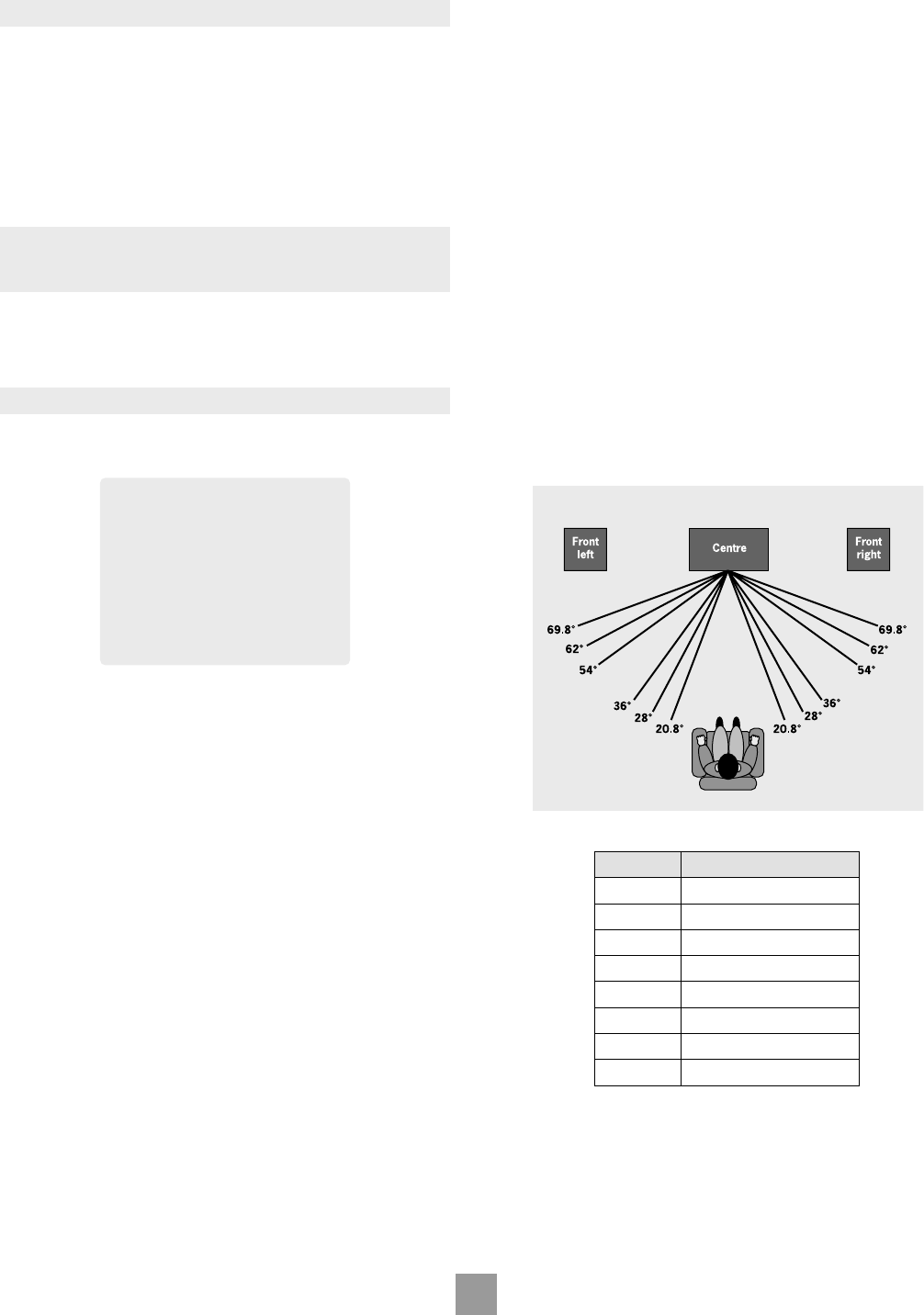
E-22
E-22
E-23
English
Stereo Direct: If Stereo direct is Off, the AV8 functions in its normal
way.
If stereo direct is On, the AV8 uses the analogue input signal for the
source, bypassing the digital circuitry. In this mode, the AV8 functions
like an analogue preamp: it also shuts down all the unused digital
circuitry for optimum stereo performance.
NOTE: In Direct mode no digital output is available.
Bass and Treble: These allow you to alter the bass and treble controls
temporarily for all currently active speakers. In the case of Stereo, this
would only apply to the front left and right speakers. In Effects, Pro
Logic II Music, Dolby Digital and DTS modes (for example), this would
apply to all present speakers.
You can adjust the bass and treble by up to ±6dB. These adjustments are
in addition to those made in ‘Speaker Eq’ in the Setup Menu. However,
the maximum overall tone control range for each speaker using this
screen plus the settings in ‘Speaker Eq’ is still ±6dB (not ±12dB).
NOTE: Bass and treble alterations are not available in THX mode,
Stereo mode when ‘Audio Stereo Tone Bypass’ is set to Yes, or in
Stereo Direct mode.
Balance: To alter the sound balance temporarily between the front left
and right speakers. You can alter the sound stage to either the left or
right by up to 10dB. Note that it is not possible to shift the audio signal
completely over to one channel.
NOTE: Balance alterations are not available in THX mode.
MAIN MENU SCREEN 2
Main Menu Screen 2
Record to Tape: Source
Record to VCR: Source
Compression: Off
Lip Sync.: +0ms
Pro Logic II Music Mode:
Dimension: +3
Centre Width: +3
Panorama: Off
Record to Tape: Allows any analogue input to be directed to the tape
output, independently of the input that is being listened to.
You cannot select tape as a record source: if allowed this would cause
feedback through the tape recorder.
If ‘Record to VCR’ is set to the tape input, you cannot select the VCR
input as a ‘Record to Tape’ option. If allowed this would cause feedback
through the VCR.
Record to VCR: Allows any analogue audio, together with Composite
or S-video input, to be directed to the VCR output. The selection is
independent of the input that is currently being listened to or
watched.
You cannot select VCR as a record source: if allowed this would cause
feedback through the VCR.
If ‘Record to Tape’ is set to the VCR input, you cannot select the tape
input as a ‘Record to VCR’ option. If allowed this would cause feedback
through the tape recorder.
Compression: Allows selection of two different compression
ratios (medium and high) which are ideal for late night listening. The
compression effect increases the volume of the quiet passages and
decreases the volume of the louder passages. Compression can be
disabled by setting to Off.
Compression is only available on Dolby Digital recordings and on some
DTS recordings.
Lip Sync: Allows the introduction and adjustment of a time delay
between the audio and video signals to compensate for the sound and
picture not being synchronised. This is normally required when extra
video processing is used in the system for line doubling or progressive
scan video. The range of lip sync delay is -5 to 220 milliseconds.
The other use for lip sync is when a DVD has been poorly mastered or
a broadcast shows noticeable delay between the video and audio.
The lip sync function works on all sources, unless Stereo Direct is
selected. Lip sync is also directly available on the SYN button on the
remote control.
The lip sync adjustment can only correct for delayed video: if the audio
is delayed, set lip sync to its minimum.
Pro Logic II Music Mode
This allows the adjustment of the sound field for Dolby Pro Logic II
Music decoding of two-channel sources.
Dimension: allows the user gradually to adjust the soundfield
either towards the front or towards the rear. If a recording is
too spacious or strong from the surrounds, it can be adjusted
‘forward’ to get a better balance. Likewise, if a stereo recording is
somewhat too ‘narrow’ sounding, it can be adjusted toward the
rear to get a more enveloping, immersive result. We recommend
‘Dimension’ is set to 3 for normal use.
Centre Width: With Pro Logic decoding, dominant centre
signals come only from the centre speaker. If no centre speaker
is present, the decoder splits the centre signal equally to the
left and right speakers to create a ‘phantom’ centre image. The
Centre Width control allows variable adjustment of the centre
image so it may be heard only from the centre speaker; only
from the left/right speakers as a phantom image; or from all
three front speakers to varying degrees. We recommend ‘Centre
Width’ is set to 3 for normal use.
Display Centre spreading effect
0 No centre spreading
1 20.8°
2 28°
3 36°
4 54°
5 62°
6 69.8°
7 Phantom centre
Panorama Mode: Extends the front centre image to include the
surround speakers for an exciting ‘wrap-around’ effect with side wall
imaging.


















